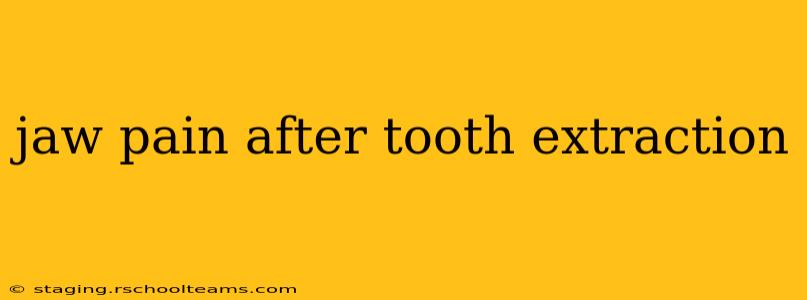Experiencing jaw pain after a tooth extraction is a common occurrence, often stemming from the surgical procedure itself. While some discomfort is expected, persistent or severe pain requires attention. Understanding the potential causes, effective treatment options, and preventative measures can significantly improve your post-extraction experience. This comprehensive guide will address your concerns and provide valuable insights into managing jaw pain following tooth removal.
What Causes Jaw Pain After Tooth Extraction?
Several factors contribute to jaw pain following a tooth extraction. The most common include:
- Inflammation: The extraction site naturally inflames as part of the healing process. This inflammation can spread to the surrounding tissues, including the jaw, causing pain and discomfort.
- Dry Socket: This painful complication occurs when the blood clot protecting the extraction site dislodges or dissolves prematurely. The exposed bone and nerve endings are highly sensitive, leading to significant jaw pain.
- Infection: Infection at the extraction site can cause localized pain that radiates to the jaw. Signs of infection include increased pain, swelling, redness, pus, and fever.
- TMJ (Temporomandibular Joint) Dysfunction: The temporomandibular joint connects your jaw to your skull. The extraction process, particularly complex extractions, can sometimes affect this joint, resulting in jaw pain, clicking, or locking.
- Sinus Involvement: Extractions in the upper jaw, particularly molars, can sometimes involve the maxillary sinus. This can lead to sinus pain that might feel like jaw pain.
- Muscle Strain: Opening your mouth wide during the extraction or clenching your jaw afterward can cause muscle strain and subsequent pain.
- Nerve Damage (Rare): Although rare, nerve damage during extraction can cause prolonged jaw pain and numbness.
How Long Does Jaw Pain After Tooth Extraction Last?
The duration of jaw pain varies depending on the complexity of the extraction, individual healing capacity, and the presence of any complications. Generally, mild to moderate pain should subside within a week. However, persistent or worsening pain beyond a week warrants a visit to your dentist.
How to Treat Jaw Pain After Tooth Extraction?
Managing post-extraction jaw pain involves a combination of approaches:
- Over-the-counter pain relievers: Ibuprofen (Advil, Motrin) or acetaminophen (Tylenol) are commonly recommended. Always follow the dosage instructions on the packaging.
- Ice packs: Applying ice packs to the affected area for 15-20 minutes at a time, several times a day, can reduce swelling and pain.
- Rest: Avoid strenuous activities and get plenty of rest to allow your body to heal.
- Soft food diet: Stick to soft foods for the first few days to avoid putting pressure on the extraction site.
- Saltwater rinses: Gentle rinsing with warm saltwater can help keep the area clean and promote healing.
- Prescription medication: In cases of severe pain, infection, or dry socket, your dentist may prescribe stronger pain relievers or antibiotics.
Can I Use Heat or Cold for Jaw Pain After Tooth Extraction?
Initially, cold compresses are recommended to reduce swelling and inflammation. After the initial 24-48 hours, applying warm compresses can help improve blood flow and promote healing, but only if your dentist advises this.
What to Do if Jaw Pain After Tooth Extraction is Severe?
Severe or persistent jaw pain after a tooth extraction warrants immediate attention. Contact your dentist or oral surgeon if you experience:
- Intense, throbbing pain
- Swelling that significantly increases
- Fever
- Pus or discharge from the extraction site
- Numbness or tingling in the jaw or face
- Difficulty opening or closing your mouth
How Can I Prevent Jaw Pain After Tooth Extraction?
While not all jaw pain is preventable, taking preventative measures can minimize the risk:
- Follow your dentist's instructions carefully: Adhering to post-operative care instructions is crucial for proper healing.
- Avoid smoking: Smoking can impede healing and increase the risk of dry socket.
- Maintain good oral hygiene: Brush and floss gently, avoiding the extraction site.
- Properly manage stress: Stress can exacerbate pain. Practice stress-reducing techniques.
This information is intended for general knowledge and does not substitute professional medical advice. Always consult your dentist or oral surgeon for any concerns regarding jaw pain or other post-extraction complications. Prompt attention can help ensure optimal healing and prevent potential problems.
